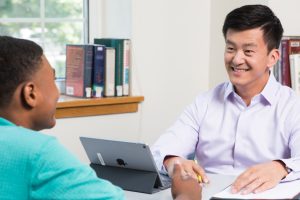Description
Prior to the COVID-19 pandemic, schools in the U.S. too often ignored or inadequately responded to the social, emotional and psychological needs of students. School closures have only added to the mental health challenges, with many, including high achievers, experiencing anxiety, depression and a variety of other issues.
This seminar, exploring how schools can support student mental health, asks important related questions: How might schools be organized to better address students’ emotional well-being? Can access to social workers, counselors and other support services be expanded without significant increases in funding?
Hosted by Pedro A. Noguera, dean of USC Rossier School of Education, and moderated by Elizabeth Green, co-founder and CEO of Chalkbeat. Panelists include Mary Helen Immordino-Yang, professor at USC Rossier School of Education; José Muñoz, director of Coalition for Community Schools; and Bror Saxberg, vice president of Learning Sciences at Chan Zuckerberg Initiative.
Who Will Benefit
– Education leaders looking to support students in combating feelings of disconnection and isolation
– Mental health professionals who want to address students’ emotional well-being during the pandemic
– Educators hoping to navigate school-wide responses to traumatic stress
About Our Featured Faculty
Pedro A. Noguera is the Emery Stoops and Joyce King Stoops Dean of the USC Rossier School of Education. A sociologist, Noguera’s research focuses on the ways in which schools are influenced by social and economic conditions, as well as by demographic trends in local, regional and global contexts. He is the author, co-author and editor of 13 books. Prior to being appointed Dean of the USC Rossier School of Education, Noguera served as a Distinguished Professor of Education at the Graduate School of Education and Information Studies at the University of California, Los Angeles. Before joining the faculty at UCLA he served as a tenured professor and holder of endowed chairs at New York University (2004-2015), Harvard University (2000-2003) and the University of California, Berkeley (1990-2000).
Mary Helen Immordino-Yang, EdD, studies the psychological and neurobiological bases of social emotion, self-awareness and culture and their implications for learning, development and schools. She is a professor of education at the USC Rossier School of Education, a professor of psychology at the Brain and Creativity Institute, a member of the Neuroscience Graduate Program Faculty at USC and director of the USC Center for Affective Neuroscience, Development, Learning and Education (CANDLE). Immordino-Yang was elected 2016-2018 president of the International Mind, Brain and Education Society by the society’s membership. She is serving as a distinguished scientist on the Aspen Institute’s National Commission on Social, Emotional and Academic Development, where she was selected to the sub-committee of six scientists and educators drafting a working definition of SEAD. She is appointed to the National Academies of Sciences, Engineering, and Medicine’s Committee on the Science and Practice of Learning.






